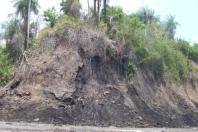Shell shock: Rio Blanco oil shale project axed
Shell shock: Rio Blanco oil shale project axed
GJ Sentinel
In a major setback to the effort to develop oil shale in the United States, Shell is closing down its research and development project in Rio Blanco County.
The company was the biggest player in oil shale in Colorado, having begun working in western Colorado’s Piceance Basin in 1996 and holding three federal research, development and demonstration leases.
“It’s very discouraging to see Shell leave because they’ve been the stalwarts in this business for a couple of decades really,” said Glenn Vawter, executive director of the National Oil Shale Association industry group.
“Whether it’s the death knell for the oil shale industry we’ll have to wait and see,” he said, pointing to several other ongoing projects in Colorado and Utah.
Oil shale is kerogen locked up in rock that companies have tried for generations to economically produce oil from through heating. World-class oil shale deposits exist in northwest Colorado, and Shell has been evaluating means of producing oil by cooking shale in place underground, or in-situ.
Chevron, which also received a research and development lease from the BLM in Rio Blanco County, decided early last year to divest itself of the lease, saying it wanted to focus on other priorities.
Critics of oil shale development projects, particularly on federal land, worry about the potential water demands and environmental and community impacts.
Ross Lane, director of the Western Values Project oil and gas accountability organization, said in a prepared statement, “Melting oil shale rock at temperatures exceeding 700 degrees over months or years is an expensive and risky proposition. It’s no wonder both Shell and Chevron stopped gambling on oil shale. The economics just don’t make sense.”
Shell spokeswoman Carolyn Tucker said the decision reflects an evolving energy market since Shell began its oil shale research in 1981.
“We plan to exit our Colorado oil shale research project in order to focus on other opportunities and producing assets in our broad Global portfolio,” she said in an email. “Our current focus is to work with staff and contractors as we safely and methodically stop research activities at the site.”
No quick exit
Tucker said in an interview that employment at Shell’s oil shale research site has ranged anywhere from 10 to 50, depending on activity levels.
“It’s not going to be an abrupt exit,” she added.
Shell has obligations and projects it needs to wind down, including reclamation and decommissioning work required by the Bureau of Land Management, she said.
Contacted late Tuesday afternoon about Shell’s plans, the BLM was unable to provide immediate comment.
Just last month, Shell announced plans to sell its oil and gas project in Routt and Moffat counties. That followed an earnings decline and a review of Shell’s various oil and gas projects in the Americas, followed by a decision to keep those with the most growth potential.
At that time, Tucker said that decision had no bearing on its oil shale project, calling it a separate business that’s still in the research stage.
But she said this week’s decision results from another review project looking specifically at Shell’s oil shale assets, which also include holdings in Jordan and Canada.
“A number of factors went into the decision. Based on those many factors we’ve chosen to put those resources into the other oil shale assets and not in Colorado,” Tucker said.
In 2010, Shell withdrew an application for shale-related water rights on the Yampa River, saying the global economic downturn was affecting its project’s pace, but that the project was continuing.
TOUGH TIME FOR ENERGY
Rio Blanco County Commissioner Jeff Eskelson said it’s still a tough time for the energy industry and it’s not surprising to see a company end an R&D project. He said the number of jobs affected is relatively low.
“But still, any jobs that leave are going to hurt so we don’t like that.”
As for what Shell’s announcement could mean for the future of the oil shale industry, Eskelson said Enefit is “going great guns” on a project just across the border in Utah, to the point that Rio Blanco County is trying to figure out how to get roads to the facility due to the jobs being projected.
“It looks like the future of oil shale right now is over there in Utah,” said Vawter, who also pointed to the work Red Leaf Resources is doing there.
The Utah projects involve surface mining, while projects in Colorado have been focusing on in-situ development. American Shale Oil, or AMSO, continues to pursue a Rio Blanco County project involving a federal RD&D lease. In addition, the BLM late last year issued a second round of RD&D leases to ExxonMobil Exploration Co. and Natural Soda Holdings, Inc., both for Rio Blanco County in-situ projects.
But Vawter is struck by the decisions of two major companies, Shell and Chevron, to back away from their shale projects.
TWO PULLOUTS
“We’ve always kind of decided that if the big oil companies put their money and time into it it’s going to be a success, but over the years that’s really not materialized. Maybe it’s time for the entrepreneurs to come in and decide if this industry is going forward,” he said.
ExxonMobil’s project represents a return to oil shale after it pulled out of a major undertaking in 1982, leaving thousands in the area without jobs.
Unlike ExxonMobil’s prior undertaking, Shell had been taking a lower-key but methodical and longer-term approach to oil shale.
It has conducted several pilot projects, including using heater bores to heat and produce oil from underground and successfully testing a freezewall technology designed to protect surrounding groundwater from heated areas.
THREE FEDERAL LEASES
Much of its work to date has been on its own land, but it recently finished a construction project on one of its three federal leases and began moving forward there with solution mining of nahcolite, or baking soda. It planned to test whether it can produce both nahcolite, and then shale afterward in the same formation.
“We’ve done a tremendous amount of work in Colorado oil shale. Some of the technological advances are really strong. We’ve employed some of the learnings and breakthroughs in Colorado to the other oil shale assets,” Tucker said.
Shell’s three leases each entail 160 acres, but with the option to convert them to commercial leases each covering about eight square miles if they meet certain criteria.
As for the possibility of selling any assets, “Those discussions are probably in the really early stage in terms of what to do with the project,” Tucker said.
She noted that Shell also owns about 50,000 acres in and around the Piceance Basin, acquired for oil shale and other reasons.
“We’ve been a landowner in the area for over 50 years so we’re not going to be making any decisions in the short term on any of those aspects either,” she said.
As part of a lawsuit settlement, the BLM is re-evaluating its commercial oil shale leasing rules, including royalty rates. Shell has argued in favor of the existing rules and cited a need for regulatory certainty. Tucker on Tuesday declined to say if the federal government’s approach to oil shale contributed to its decision.
“It isn’t the rules that made this impossible, it’s the economics,” said Jim Spehar, a former Grand Junction mayor and Mesa County commissioner who supports shale reforms the BLM has been undertaking.
” … This is just the latest example of a long string of oil shale promises that have fallen victim to the economic realities,” he said.
http://www.gjsentinel.com/news/articles/shell-shock-8232rio-blanco-oil-s...


